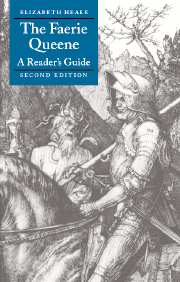3 - BOOK 3
Published online by Cambridge University Press: 18 December 2009
Summary
The virtue of chastity
I call not that Virginity a vertue, which resideth only in the Bodies integrity … But I call that Virginity a vertue which is willing and desirous to yeeld it selfe upon honest and lawfull terms, when just reason requireth; and until then, is kept with a modest chastity of Body and Mind.
(John Donne, Paradoxes and Problemes xii)Spenser's celebration of chastity in Book 3 should be put in the same context of Protestant praise for married love that informs Donne's apparent paradox. Chastity in this view is as much an aspect of marriage as it is of virginity; indeed many Protestants gave marriage precedence over virginity as the natural and blessed calling of men and women. Milton wrote of the love for which marriage was instituted:
What is it then but that desire which God put into Adam in Paradise before he knew the sin of incontinence; that desire which God saw it was not good that man should be left alone to burn in; the desire and longing to put off an unkindly solitarines by uniting another body, but not without a fit soule to his in the cheerfull society of wedlock?
(The Doctrine of Divorce Book 1, chap. 4)Chastity in Book 3, in spite of the preoccupation of the Proem with the example of Queen Elizabeth, is emphatically conceived in terms of the chaste and God-given desire which Milton describes.
- Type
- Chapter
- Information
- The Faerie Queene: A Reader's Guide , pp. 73 - 96Publisher: Cambridge University PressPrint publication year: 1999



